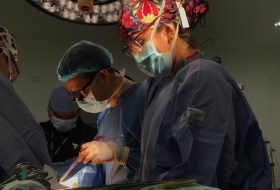News
Unicauca Doctors Participate in Study Aimed at Improving Elective Surgical Care Globally
The research study involved 18,058 patients from 640 hospitals across 83 countries, analyzing access to and the quality of elective surgical care for inguinal hernia repair. In the city of Popayán, the research team was led by the Anesthesiology Research Group (GRIAN).
The Anesthesiology Research Group GRIAN, along with the San José University Hospital and Susana López de Valencia Hospital, participated in an international collaborative study titled "Hernias, Pathway and Planetary Outcomes for Inguinal Hernia Surgery (HIPPO)", which was published in the prestigious journal "The Lancet". The study analyzed access to and the quality of elective surgical care for inguinal hernia repair in 83 countries.
The study, "Access and quality of elective care: a prospective cohort study using hernia surgery as a tracer condition in 83 countries", was coordinated and led by the NIHR Global Health Research Unit on Global Surgery. The University of Cauca research team included Dr. José Andrés Calvache, Anesthesiologist and Algologist, and Dr. Diana Catalina Cardona, General Surgery Resident. The team from Popayán also included General Surgeons Alexei Rojas and César Pastas, as well as medical students Daniel Muñoz, Isabela Bolaños, and Daniela Patiño.

The research study, which involved 18,058 patients from 640 hospitals worldwide, highlighted several key findings:
- Emergency Surgery: 1,287 patients (7.1%) underwent emergency surgery, with rates increasing from high-income to low-income countries (6.8%, 9.7%, 11.4%, 14.2%).
- Intestinal Resection: Rates of intestinal resection also increased (1.2%, 1.4%, 2.3%, 4.2%) according to the income level of the countries.
- Assessment of Access and Quality: The study assessed access to surgery (emergency surgery rates, intestinal resection rates, and waiting times) and the quality of care (use of mesh, ambulatory surgery rates, and postoperative complications), comparing income groups defined by the World Bank.
- Multilevel Regression Model: Factors associated with postoperative complications were explored using a three-level logistic regression model.
This study has identified key areas for policy makers' intervention, highlighting the importance of affordable and funded health insurance, whether provided by the government or through individual means. Financing these pathways will be a challenge, especially if elective care must compete with emergency care. The study underscores the need to increase insurance coverage for common conditions globally, preventing out-of-pocket payments from limiting access to elective care or causing catastrophic expenses for families.

The University of Cauca congratulates its faculty and students for their contribution to this important research, which not only highlights their academic and professional excellence but also underscores their commitment to improving global healthcare.
For more information:
Vice Rectorate for Research


